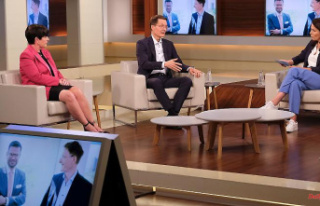At the start of the week, Chancellor Scholz gathers employers, trade unions and experts in the Chancellery. The federal government wants everyone to commit to common goals in the fight for social peace. Union parliamentary group leader Spahn expresses great skepticism.
The deputy leader of the Union parliamentary group in the Bundestag, Jens Spahn, expressed skepticism about the opening meeting of the concerted action on Monday. Instead of one-off payments, it should be about reducing income tax, Spahn told the “Redaktionsnetzwerk Deutschland”.
"To counteract a dangerous wage-price spiral together with trade unions and employers is the right thing to do," said the CDU politician. "Unfortunately, the Chancellor's push for a one-off payment put a strain on the talks in advance." Nobody takes up the proposal, trade unions and the FDP rejected it. "The chancellor's one-off payment has become a flash in the pan."
"In view of this starting position, we are curious to see what will come out of a two-hour meeting," Spahn continued. "Sustainable and targeted income tax relief is now needed so that, especially for small and medium-sized incomes, there is more net than gross." In addition, the federal government must lower the electricity tax and combine relief with incentives, demanded the parliamentary group leader: "Whoever saves gas gets money, because every kilowatt hour saved is a valuable one."
The coalition factions in the Bundestag go into the opening meeting of the "Concerted Action" in the Chancellery with very different demands. According to the RND, the Greens want to relieve low earners, the FDP is demanding tax cuts for middle-income earners and the SPD, like host Olaf Scholz, is focusing on long-term effects.
Like Chancellor Scholz, the Parliamentary Secretary of the SPD, Katja Mast, lowered expectations of the concrete results of the opening meeting. "The concerted action is the right step in view of the existing and upcoming challenges," said Mast. "Of course we don't solve all challenges in one day. But we tackle them together and look for effective solutions. That counts." Olaf Scholz described the concerted action in the ARD summer interview as a "long conversation that we want to have so that we can overcome the crisis together".
The federal government has a famous model for its approach: the concerted action of 1967, orchestrated by the social democratic Federal Minister of Economics Karl Schiller. When the economic growth that had lasted for a long time after the Second World War collapsed for the first time, Schiller brought all the relevant actors, and in particular employers and trade unions, to one table.












